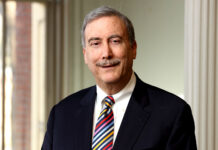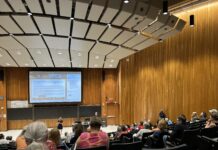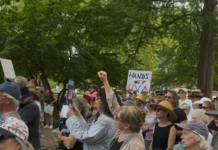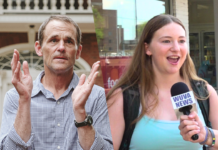Virginia Governor Ralph Northam is waging a new campaign this year to tackle the opioid crisis that killed more than 1,200 Virginians in 2017. He’s doing this with almost $16 million in federal funds directed toward treatment and recovery clinics statewide. Northam has also launched a statewide tour, featuring the story of a recovering addict who is convinced that available treatment for addicts is the only way out of the crisis.
Former opioid addict Ryan Hall, a native of Covington VA, has made several appearances with Northam trying to convince Virginians to invest more money in immediate counseling for anyone who has overdosed in opioids. Among these locations was the University, specifically Pinn Hall Conference Center auditorium.
Hall spoke to University medical students about the need for more available rehabilitation in contrast with the limited access to treatment for opioid abusers in the commonwealth. Students were informed of the potential positive effects of incorporating more drug courts into recovery processes in the commonwealth. If drug courts had been available in Alleghany County during the peak of his addiction, Hall could have avoided several criminal charges and a record as a convicted felon. Discussion allowed students to see the opioid crisis not only from the medical standpoint that they are familiar with, but also from the criminal justice standpoint centered around the war on drugs.
“We are nowhere near close to having enough therapy for drug recovery. The more drug courts we have the better… with Northam’s plans whenever someone overdoses they have same day access to the community service board and their services such as intensive outpatient and rehab.”
Funding for Northam’s grants is provided by the U.S. Substance Abuse and Mental Health Services Administration (SAMHSA) to breach the gap between the rising number of addicts and available clinic space. The demand for treatment exceeds the capacity of existing clinics in the Commonwealth. Just 11% of Virginians with a substance abuse disorder and 30% of Virginians with an opioid abuse disorder received treatment in the past year.
Only 20% of Virginians with substance abuse disorders are able to receive treatment through Medicaid, while the remaining 80% are not. By January, 60,000 substance abusers will be eligible for Medicaid and have access to current treatment systems that do not have the capacity for new patients.
During his drug addicted years, Hall was jailed twice for selling drugs. While time in jail gave him the will to recover, Hall believes Virginia should adopt more systems of drug courts, in which a judge refers an addict to treatment first, not a jail cell. According to the United States Department of Justice, there are currently 3100 drug courts across the United States. Forty-four of those are located in Virginia, but none in Alleghany County.
“If we had a drug court during when I went to jail then I would have been able to rehabilitate myself and get informed and go the recovery step without going to jail, but instead I went to jail and am a convicted felon,” Hall claims.
Hall says his path to recovery involved a combination of drug therapy, counseling and his Christian faith.
“I’ve done counseling, intensive outpatient, rehab, acupuncture, yoga,” Hall said. “Overall, mostly the fellowship at Loving Life Church has been the most helpful, and being around other addicts and talking with them and sharing our stories has helped me a great deal.”
Funding from the grants will support the initiatives of Virginia’s Community Services Boards as well as allow research on treatment methods through the Virginia Higher Education Collaborative. Initiatives include revising regulations on opioid prescriptions, altering the Prescription Monitoring Program, and developing more treatment clinics and rehabilitation programs like the drug courts Hall described.
Mishka Terplan, M.D. is the medical director at VCU Health’s Motivate Clinic, an outpatient facility in Richmond, Virginia, designed to treat people struggling with addiction.
Dr. Terplan recognizes the need for funds to increase clinic space, but explains how funds should first go towards the need for more counselors.
“I think what we need to do is find ways to increase provider capacity, that means bringing more providers to the table… and then we also need to support providers,” Terplan said. “We need to find ways to make sure that people who might be somewhat new to addiction treatment services get the support they need to provide care.”
According to Dr. Terplan, approximately more than half of people with opioid abuse disorders could not get treatment even if they wanted it due to a lack of providers. Furthermore, within existing clinics, there is not enough space for patients seeking care.
There are approximately 350 active participants in the Motivate clinic, however, Dr. Terplan explained how the need for treatment in the Richmond area is greater than what the Motivate clinic can provide.
“There is not enough space within these facilities, and it’s great that there are these clinics but… the need [and] the demand exceeds the capacity,” Terplan said. “Even our clinic within the region cannot treat all the people that need care.”
According to the US National Library of Medicine, the FDA has approved three medications for the treatment of opioid dependence – methadone, buprenorphine and naltrexone. These are being used to perform pharmacotherapy at clinics, like Motivate, and are strongly supported by evidence-based data. Behavioral counseling also has a large role in recovery and has proven to be successful when paired with drug detoxification. Funding from the grants helps pay for the kind of drug therapy proven successful.
Dr. Terplan described the method for success documented within the Motivate Clinic to be a combination of different approaches to recovery.
“When we have medicines, I feel that we should use them…the evidence based data strongly supports pharmacotherapy with behavioral counseling,” Terplan said.
He went on to describe how the recovery process is individualized to cater to the needs of each patient.
“The big picture is that the goal is recovery, and there’s multiple different paths to recovery,” Terplan said. “However, people get there, and however we can support them getting there, I am in favor of that.”
Hall believes the first step in recovery is education and awareness of the current state of the epidemic. It is crucial that medical professionals addressing the opioid crisis understand the issue from a first-hand account. By attending Hall’s appearances, students at the University’s School of Medicine are gaining valuable, real-world experience that will enhance their work in the University’s Health System.
Speaking directly to those personally affected by this statewide health crisis has great value for University medical students who are attempting to make a difference in the future of the medical world. As the potential future doctors of the commonwealth, it is crucial that University medical students understand that recovery looks different for each recovering addict. Communication is essential when determining the best available method of rehabilitation for each patient.
“The most impactful moment that I have felt was when I realized that I can talk to drug addicts all day, but I can’t directly help them,” Hall said. “Now traveling with Northam, and speaking to doctors, so many more lives will be impacted because they’ve heard the stories and know the consequences.”
Hall found the most success when combining pharmacotherapy with behavioral counseling routed in a strong community. The experiences and relationships Hall has formed through his church are the reason why he continues to travel and speak with Northam, although funding from the grants cannot directly go to religious organizations.
“I’m promoting myself,” Hall said. “You have to educate the youth, the addicts, the people who are going to handle the addicts like the doctors, the police, the first responders. The addicts that are successful are helping others. Helping others helps yourself.”
Hall sees himself as a transitional figure between recovering substance abusers and authoritative figures like Governor Northam.
“I do respect his position and he can get something done about the issue based on the things that I say,” Hall said. “He really does understand the opioid crisis and he’s got a passion for it… It’s a major health crisis, and he’s doing really great things in Virginia right now.”
Funding from the federal grants Virginia received to fight the opioid addiction crisis is already being put into action by Governor Northam. In May, Northam signed a bill into law that gives Virginia cities and counties the power to establish local review teams to examine deaths suspected to be caused by an overdose. Funds are also being used to supply Narcan, a drug which can reverse an opioid overdose, to state police officers.
Hall hopes to see funding from Northam’s federal grants go towards more facilities to fill the gap between available treatment and patients seeking care.
“It’s going to affect the community tremendously, hopefully it will bring more drug courts.”
Hope remains in the face of adversity because of people like Governor Northam, Ryan Hall, Dr. Terplan and medical students at the University who represent government, health care professionals, and every day people who are working together to address the opioid addiction crisis in the Commonwealth of Virginia.
“It’s very humbling to do this kind of work and I feel very lucky to work in this kind of space at this moment in time in the city. It’s not been without its ups and downs but on the whole, I’m hopeful that we’re making a small difference,” concluded Terplan.
















